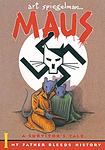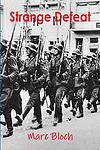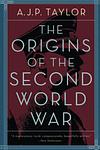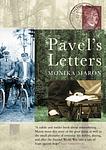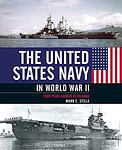The Greatest "Nonfiction, World War II" Books of All Time
Click to learn how this list is calculated.
This list represents a comprehensive and trusted collection of the greatest books. Developed through a specialized algorithm, it brings together 300 'best of' book lists to form a definitive guide to the world's most acclaimed books. For those interested in how these books are chosen, additional details can be found on the rankings page.
Genres
The category of "World War II" books encompasses a wide range of literature that focuses on the events, people, and consequences of the global conflict that took place between 1939 and 1945. This category includes historical accounts, memoirs, biographies, and fiction that explore the political, social, and cultural aspects of the war, as well as its impact on individuals and societies around the world. From the Holocaust to the Pacific theater, from the home front to the battlefields, "World War II" books offer readers a deep understanding of one of the most significant and devastating events in human history.
Countries
Date Range
Reading Statistics
Click the button below to see how many of these books you've read!
Download
If you're interested in downloading this list as a CSV file for use in a spreadsheet application, you can easily do so by clicking the button below. Please note that to ensure a manageable file size and faster download, the CSV will include details for only the first 500 books.
Download-
1. The Diary of a Young Girl by Anne Frank
This book is a real-life account of a young Jewish girl hiding from the Nazis during World War II, written in diary format. The girl and her family are forced to live in a secret annex in Amsterdam for two years, during which she writes about her experiences, fears, dreams, and the onset of adolescence. The diary provides a poignant and deeply personal insight into the horrors of the Holocaust, making it a powerful testament to the human spirit.
-
2. If This Is a Man by Primo Levi
This book is a deeply moving and insightful memoir of a survivor of Auschwitz, a Nazi concentration camp during World War II. The author, an Italian Jew, provides a detailed account of his life in the camp, the brutal conditions, the dehumanization, and the struggle for survival. The narrative is a profound exploration of the human spirit, resilience, and the will to live, despite unimaginable horror and suffering. It also raises profound questions about humanity, morality, and the capacity for evil.
-
3. Maus by Art Spiegelman
This graphic novel tells the story of a Holocaust survivor, as narrated by his son. The unique use of animals to represent different nationalities and ethnic groups adds a distinctive layer to the narrative. The protagonist's father recounts his experiences as a Polish Jew during World War II, offering a poignant depiction of the horrors of the Holocaust. The narrative also explores the complex father-son relationship, revealing the impact of such traumatic historical events on subsequent generations.
-
4. Hiroshima by John Hersey
This book provides a detailed account of the aftermath of the atomic bombing of Hiroshima during World War II, as experienced by six survivors. The narrative follows the survivors from the moment of the explosion to their lives in the following years. It explores their struggles, their resilience, and the profound physical, emotional, and social impacts of the event, offering a poignant examination of the human capacity to endure and rebuild in the face of unimaginable devastation.
-
5. The Second World War by Winston Churchill
This book provides a comprehensive overview of the Second World War from the perspective of one of its most influential leaders. It covers the entire span of the war, from its origins in the political and economic turmoil of the 1930s, to the major battles and strategic decisions that shaped its course, to its aftermath and impact on the world. The author's unique perspective and firsthand experience, combined with his eloquent and insightful writing, make this a definitive account of one of the most important events in modern history.
-
6. Schindler's List by Thomas Keneally
The book tells the true story of a German businessman who saves more than a thousand Polish Jews during the Holocaust by employing them in his factories. The protagonist's transformation from a greedy high living war profiteer to a savior of lives forms the crux of the narrative. It offers a chilling yet inspiring account of the horrors of the Holocaust, human resilience, and the power of one individual to make a significant difference.
-
7. Night by Elie Wiesel
This book is a memoir of the author's experiences during the Holocaust, specifically in the Auschwitz and Buchenwald concentration camps. The narrative focuses on the relationship between a father and son under the most extreme circumstances, the loss of faith in God, humanity, and in each other, and the horrifying reality of the systematic genocide of six million Jews during World War II. The book is a poignant and stark examination of the depths of human evil and the enduring power of hope and survival.
-
8. The Making of the Atomic Bomb by Richard Rhodes
This comprehensive book provides an in-depth account of the development of the atomic bomb during World War II. It explores the scientific advancements that made the bomb possible, the political decisions that led to its creation, and the moral dilemmas faced by the scientists involved. The book also details the personalities of key figures in the Manhattan Project, the effects of the bomb on Hiroshima and Nagasaki, and the impact of nuclear weapons on the world.
-
9. Eichmann in Jerusalem: A Report on the Banality of Evil by Hannah Arendt
This book is a thought-provoking exploration of the trial of Adolf Eichmann, a major organizer of the Holocaust. The author argues that Eichmann was not a fanatical ideologue, but rather an ordinary individual who simply followed orders and bureaucratic procedures, highlighting the terrifying potential for evil in any system that values obedience over personal responsibility. The concept of the "banality of evil" is introduced, suggesting that horrific acts can be committed by ordinary people under certain conditions.
-
10. The Face of Battle by John Keegan
"The Face of Battle" is a military history book that examines warfare from the perspective of the common soldier. It explores three significant battles in detail - the Battle of Agincourt in 1415, the Battle of Waterloo in 1815, and the Battle of the Somme in 1916. By focusing on the experiences of the individual soldiers, the book provides readers with a unique insight into the reality of war, the strategies employed, the conditions faced by soldiers, the impact of technological advancements on warfare, and the human cost of these historic battles.
-
11. The Struggle for Europe by Chester Wilmot
"The Struggle for Europe" is a comprehensive historical account of World War II from the perspective of the Western Allies. It meticulously details the military strategies, political maneuverings, and individual battles that led to the defeat of Nazi Germany. The book also explores the aftermath of the war and the power dynamics that shaped the modern map of Europe. It provides an in-depth analysis of the decisions made by key figures during the war, and how these decisions impacted the outcome of the war and the post-war reconstruction of Europe.
-
12. The Rise and Fall of the Third Reich by William L. Shirer
This book provides a comprehensive history of Adolf Hitler's Third Reich, from its inception to its downfall during World War II. The author, an American journalist who reported from Germany and Austria during the Nazi era, uses firsthand accounts, interviews, and Nazi documents to detail Hitler's rise to power, the mechanisms of the Nazi state, and the events leading to and during World War II, including the Holocaust. The book concludes with an analysis of why the Third Reich fell and the aftermath of its collapse.
-
13. The Last Lion by William Manchester
"The Last Lion" is a comprehensive biography of Winston Churchill, providing an in-depth look at his life, from his birth in 1874 to his death in 1965. The book covers Churchill's early years, his military service, his time as a journalist, and his political career, including his role as British Prime Minister during World War II. It also delves into his personal life, relationships, and struggles with depression. The book presents a nuanced portrayal of Churchill, highlighting his strengths, flaws, victories, and defeats.
-
14. Postwar by Tony Judt
"Postwar" is a comprehensive analysis of the history of Europe from the end of World War II to the early 21st century. The book examines the major political, cultural, social, and economic changes that have shaped the continent, including the Cold War, the rise and fall of the Soviet Union, the rebuilding of Western Europe, and the challenges of integrating Eastern Europe into the European Union. It also delves into the impact of these events on the daily lives of Europeans, exploring themes of memory, identity, and the struggle to come to terms with the past.
-
15. All But My Life by Gerda Weissmann Klein
"All But My Life" is a poignant memoir of a young woman's six-year ordeal as a victim of Nazi cruelty. The narrative follows her life from a peaceful, upper-middle-class childhood in Bielitz, Poland, through her horrifying experiences and loss during the Holocaust, to her miraculous survival and marriage to an American soldier. It is a story of courage, resilience, and the enduring power of hope.
-
16. Strange Defeat by Marc Bloch
"Strange Defeat" is a wartime memoir written by a French historian who served as a soldier during World War II. In the book, the author critically analyzes the reasons behind the swift and shocking fall of France to Germany in 1940. The author attributes the defeat to the outdated strategies and poor leadership of the French military and government, and also highlights the social and political issues that plagued France at the time. The book is not only a personal account but also a profound critique of French society and its institutions.
-
17. Second World War by John Keegan
"Second World War" is a comprehensive account of the global conflict that took place from 1939 to 1945. The book offers a detailed examination of the political, military, and social aspects of the war, from the rise of Hitler and the attack on Pearl Harbor, to the Holocaust and the dropping of the atomic bomb. The author provides an in-depth analysis of the strategies and tactics used by the major powers, and presents a vivid picture of the human cost of the war. The book also includes a variety of maps and photographs to help illustrate the events and locations discussed.
-
18. Unbroken: A World War II Story of Survival, Resilience, and Redemption by Laura Hillenbrand
This book is a gripping true story of a WWII veteran, who was an Olympic runner before the war. His plane crashes in the Pacific during a reconnaissance mission, and he survives for 47 days on a raft, only to be captured by the Japanese Navy and sent to a series of brutal prisoner of war camps. Despite the immense suffering, he remains unbroken, maintaining his dignity and hope, and eventually finds redemption after the war.
-
19. The Unwomanly Face Of War by Svetlana Alexievich
"The Unwomanly Face Of War" is a powerful and poignant collection of interviews with Soviet women who fought in World War II. Through their testimonies, the author sheds light on the often overlooked and untold stories of these brave women who served as snipers, pilots, nurses, and soldiers on the front lines. The book explores their experiences, sacrifices, and the lasting impact of war on their lives, providing a unique and intimate perspective on the realities of war from a female point of view.
-
20. War Without Mercy by John W. Dower
This book provides a detailed analysis of the racial aspects that influenced the Pacific War during World War II. It explores the racial stereotypes, propaganda, and policies that were used by both the United States and Japan, and how these factors contributed to the extreme violence and hatred that characterized the conflict. The book also examines the impact of these racial attitudes on the post-war relations between the two countries.
-
21. Pavel's Letters by Monika Maron
"Pavel's Letters" is a poignant narrative that explores the personal journey of a novelist who uncovers her family's past in war-torn Poland. After receiving a collection of letters from her grandfather, Pavel, the protagonist delves into the history of her family, their experiences during World War II, and the hardships they faced under Stalin's regime. The book is a compelling blend of personal memories, historical facts, and the exploration of the human spirit's resilience in the face of adversity.
-
22. The Two-Ocean War: A Short History of the United States Navy in the Second World War by Samuel Eliot Morison
This book provides a comprehensive history of the United States Navy's role in World War II, covering both the Atlantic and Pacific theaters. It details significant naval battles, strategies, and the role of key individuals. The book also delves into the technological advancements of the time, including the development of aircraft carriers and submarines, and their impact on the outcome of the war. The author's firsthand experience as a naval officer provides an insightful and personal perspective to the events.
-
23. A World Apart by Gustaw Herling-Grudziński
"A World Apart" is a powerful memoir that recounts the author's experiences as a political prisoner in a Soviet labor camp during World War II. Through vivid and harrowing descriptions, the book exposes the brutality and inhumanity of the camp system, as well as the resilience and strength of the prisoners. It serves as a haunting reminder of the atrocities committed during this dark period of history and the enduring human spirit.
-
24. In My Hands by Irene Opdyke
This memoir recounts the story of a Polish woman who, during World War II, worked as a housekeeper for a Nazi major while secretly aiding the Jewish resistance. She risked her life by hiding Jews in the basement of the Nazi officer's house, stealing food and supplies for them, and eventually leading them to safety. Despite the constant threat of discovery and the moral complexities she faced, she persevered in her efforts to save lives, demonstrating remarkable courage and resilience.
-
25. Shadows On The Tundra by Dalia Grinkevičiutė
"Shadows On The Tundra" is a powerful memoir that recounts the harrowing experiences of a young Lithuanian girl during World War II. Forced into a Soviet gulag in Siberia with her family, the author vividly describes the brutal conditions and the relentless struggle for survival. Through her resilient spirit and unwavering determination, she offers a poignant and haunting account of her time in the labor camp, shedding light on the lesser-known history of the Baltic states during the war.
Reading Statistics
Click the button below to see how many of these books you've read!
Download
If you're interested in downloading this list as a CSV file for use in a spreadsheet application, you can easily do so by clicking the button below. Please note that to ensure a manageable file size and faster download, the CSV will include details for only the first 500 books.
Download

